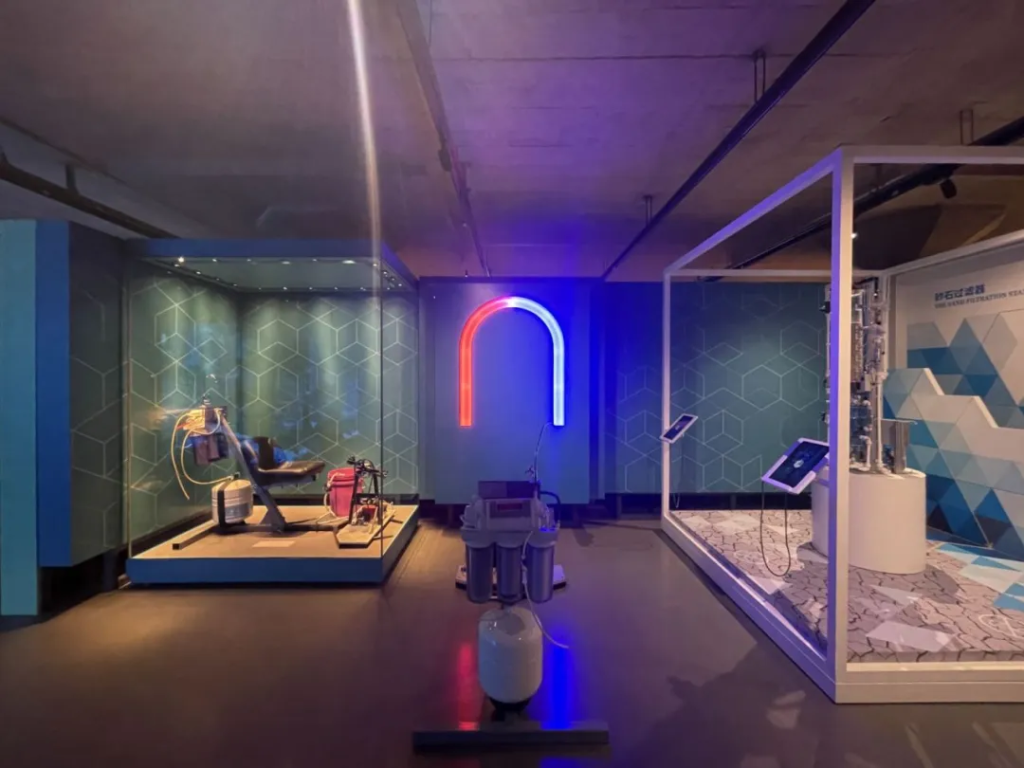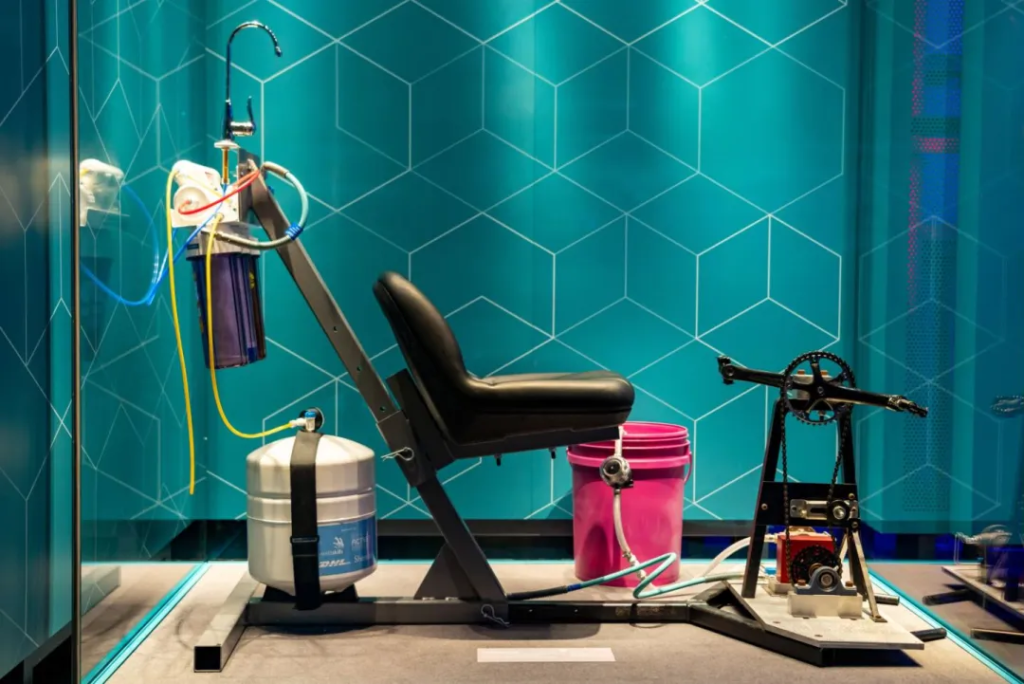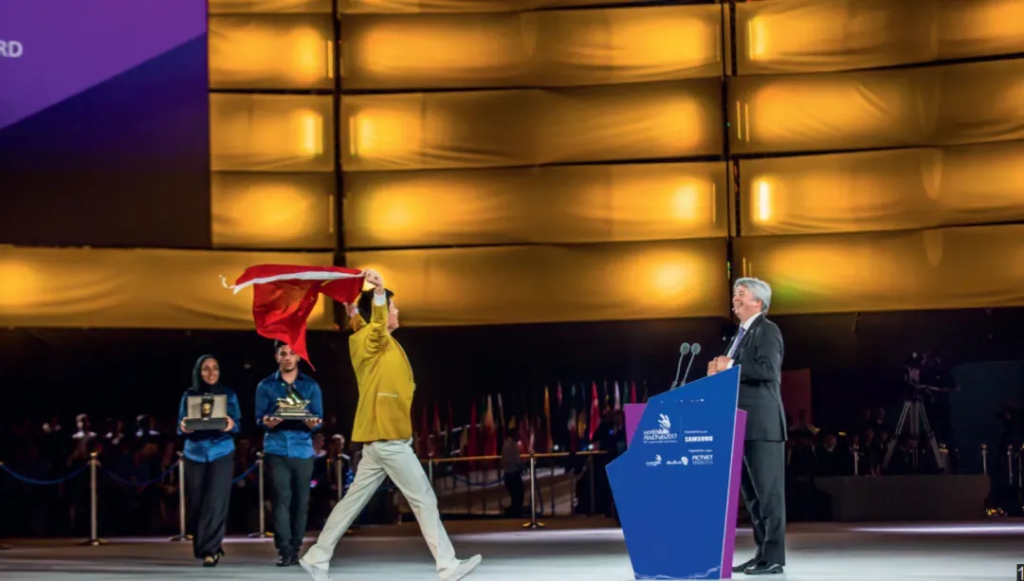One minute of pedaling for 6 litres of purified water? Ride this bike to burn calories ang get clean water

In Zone 4 of the WorldSkills Museum, “Building a better world with skills”, there is a special “bicycle”.
Getting on this bicycle in the supine position and pedaling hard, you can see in front of the LED strip where several small balls roll from the left of the red area to the right of the blue area. This whole process simulates how the pedal-powered pump and purification system works.
The pedal-powered purification system is one of the WorldSkills Competition projects of the Industrial Mechanics skill. After one minute of pedal revolution, the purification system can produce 6 litres of pure water. Song Biao, who has won the Albert Vidal Award which is the highest award of the competition for his excellent performance at the age of 19, is the first Chinese to win such award.
“It’s dubbed as ‘the water bike’, says Craig Brazil, Skill Competition Manager for the Industrial Mechanics skill and Professor at Sheridan College in Canada who has countless fond memories and stories to tell about the WorldSkills Competition.
“It’s a real-world solution”
The pedal-powered pump and purification system consists of a seat, pedal, sewage container, inlet pipe, filter, and freshwater outlet tap. At a speed of 80 revolutions per minute, the device can produce six litres of purified water per minute, and an estimated 380 litres per day if running continuously. Its prototype came from the Capstone Project by students at Sheridan College and was then optimised by Craig and Simon Heathcote, who is the test project manager.
The UAE is rich in oil and gas, but extremely poor in water resources, which inspired the test project “purifying water bike”. “After the 43rd WorldSkills Competition in 2015 in Sao Paulo, Brazil, we held a post-competition meeting to discuss preparations for the next competition,” the Chief Expert said, “the thought of holding the next competition in Abu Dhabi gave birth to this test project which was approved by all relevant Experts.”
Craig brought this idea back to Sheridan College and co-supervised four students with Simon. In less than 6 months, they developed the initial prototype of the purifying water bike. “I wanted the pedal power system to be an adjustable device that people of different heights would be comfortable pedaling. So we adopted the concept of ‘lying down on the bike’. The students came up with a design based on my idea while Simon drew up a full set of drawings, and then we built the actual prototype together”, says Craig proudly, adding that the initial student design won the school’s Capstone competition in 2016/17.

After the Capstone competition, Craig and Simon redesigned the bike to be lighter, easier to assemble, and more compliant with the requirements of the WorldSkills Competition test projects. It’s now displayed at the WorldSkills Museum.
Seven sets of water purification systems completed by participants of the 44th WorldSkills Competition were delivered to the United Nations Industrial Development Organisztion (UNIDO) to serve as a learning and knowledge development platform. Now, it’s playing a vital role in Maghreb H2O project in Morocco.
“It’s a real-world solution,” Craig said, adding that it can be adapted for a variety of areas where electricity is running short or is erratic. He also said that the pedal-based method represents a more environmentally friendly way to produce clean water since it’s a replacement for traditional electricity and power energy.
Mark Callaghan, WorldSkills Museum Project Director said, “What’s impressive about the purifying water bike is that it’s cost efficient and practical. It serves as a great example of skilled workers thinking about how to build a better world.”
“That’s my guy!”
The official debut of the purifying water bike was at the 44th WorldSkills Competition, Abu Dhabi, UAE 2017. That year, Craig was involved as the Skill Competition Manager from the initial preparation through to the competition in the Industrial Mechanics skill.
According to reports, the Industrial Mechanics project requires Competitors to complete the entire processes including parts production, welding, processing, and assembly of the purification system in a total of 20 hours over four days. Competitors have to utilize a variety of skills and knowledge in machining, welding, manufacturing, precision calibration, layout and precision manual skills. It was a test of both mental and physical strength for the Competitors. “Time management is the biggest challenge.. If problems are encountered and mistakes are made along the way, Competitors may not be able to complete the complete project.”
This is the reason why Song Biao impressed Craig.
The 44th WorldSkills Competition had more than 1,260 participants, and Song Biao, the gold medallist in the Industrial Mechanics competition, won the Albert Vidal Award with the highest score of 779 points. Since the award was formally established in 1995.
“He was very calm and steady and never panicked during each phase of the competition ”, recalls Craig, “In fact I attended the awards ceremony and the Albert Vidal Award was the last award to be presented. I remember Song Biao’s name being called and he flew to the podium, his arms waving the Chinese flag over and over again. Simon and I were saying , ‘Good job, that’s our guy from industrial mechanics’.”

“WorldSkills Competition Allows me to be a Better Teacher”
Craig’s involvement with WorldSkills dates back to 2010. Craig, as a representative of Sheridan College, communicated with WorldSkills Canada about hosting a competition related to industrial machinery. After some efforts, they were invited to present to the technical delegates at the 42nd WorldSkills Competition, Leipzig, Germany 2013. In 2015, the Industrial Mechanic Millwright skill became a demonstration skill, and has been an official competition skill since 2017.
For more than 10 years, Craig has always been passionate about the work of the WorldSkills Competition, “I’m very lucky to have this job, and I also enjoy communicating with skills experts and competitors from all over the world.” On this journey, Craig has the opportunity to discusses the future of industry development and the direction of vocational skills education with experts from all over the world, “Each country has a different system of vocational education, and I have learned new teaching methods from talking with experts from other countries.”
He believes that interactions make him a better teacher. Every time he returned from work, his students were always curious and asked him a lot about the Competition. They were so amazed at the complexity of the work as well as the workload done by the competitors at the Competition. Craig motivated them, “Practice makes perfect, and if you spend enough time immersed in training and practice, your skills can reach the same level as them.”
A month before this interview, Craig had just returned to Canada from Lyon, France. Where he continues his journey with WorldSkills as the Skill Competition Manager for the 47th WorldSkills Competition in 2024 in the Industrial Mechanics skill.
As a Skill Competition Manager, there have many days of preparation. But for Craig, it’s hundreds of hours of talking to designers about the project, developing marking schemes, organizing and documenting… All of his hard work connects teachers, specialists, and young people in this field all over the world, so that they can work together to creatively solve global problems.
This is the message Craig wants to convey to the audience of the WorldSkills Museum through the purifying water bike: all problems can be solved as long as we work together and create innovative solutions using skills.
